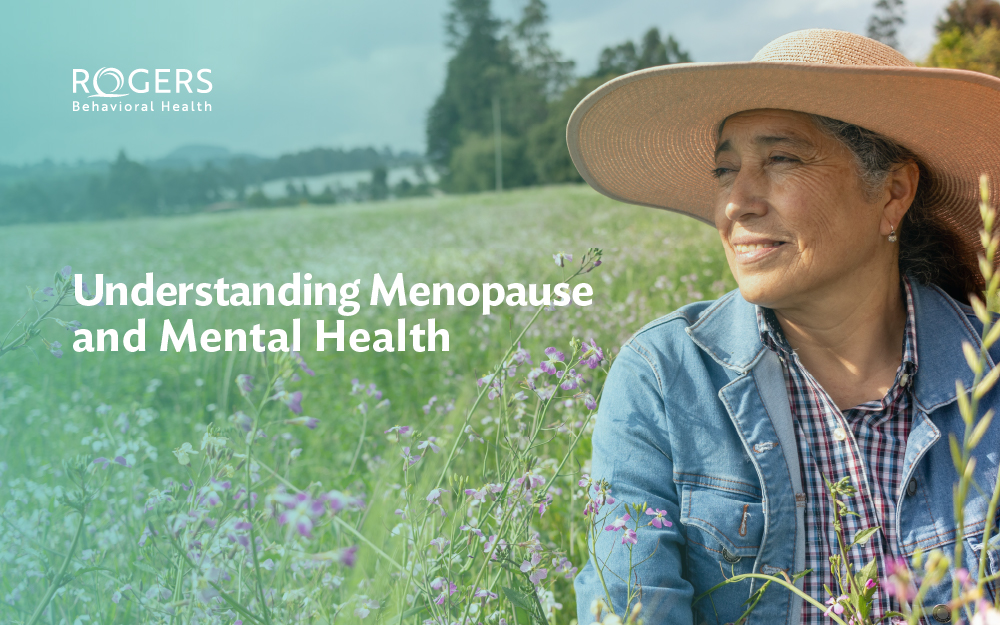Menopause is a natural part of aging for women, but it often comes with physical and emotional challenges that can feel overwhelming. Physical changes may affect how women see themselves, while hormonal shifts can lead to changes in mood that impact a woman’s mental well-being. These experiences are deeply personal but shared by many, making open conversations and education essential.
In part one of our blog series on women’s health, we looked at pregnancy and postpartum. Now in part two, we focus on perimenopause and menopause, looking at what women can expect during these transitions and practical strategies for safeguarding and nurturing their mental health.
At a basic level, what is happening with women physically in perimenopause / menopause?
Perimenopause is the transitional phase leading up to menopause. Menopause is a natural biological process that marks the end of a women’s reproductive years.
Physically, a woman experiences:
Hormonal fluctuations: Estrogen and progesterone levels begin to fluctuate leading to irregularities in the menstrual cycle. The ovaries gradually produce less estrogen and progesterone. The decline leads to various symptoms, including the following.
Menstrual changes: Periods may become irregular in terms of frequency and flow. Some women may experience heavier or lighter periods.
Vasomotor symptoms: Many women experience sudden feelings of warmth, often accompanied by sweating, known as hot flashes and night sweats due to changes in hormone levels affecting the body’s temperature regulation.
Sleep disturbances: Hormonal changes can lead to sleep problems, such as insomnia and night sweats.
Vaginal changes: Decreased estrogen levels can result in vaginal dryness, thinning of the vaginal walls, and decreased lubrication, leading to discomfort during intercourse.
Weight changes: Some women may notice weight gain or changes in body composition, particularly around the abdomen.
Skin changes: Skin may become drier and less elastic due to decreased collagen production, leading to changes in texture and appearance.
Bone density loss: Estrogen helps protect bone density, so as it declines the risk of osteoporosis increases, making bones more fragile and susceptible to fractures.
Mood swings: Women may experience changes in mood, including increased irritability or anxiety.
What mental health challenges may arise and why?
In addition to mood swings, women in perimenopause and menopause are at an increased risk for mental health challenges, such as:
- Anxiety
- Depression
- Decreased self-esteem
- Social isolation
- Increased stress
The challenges can arise from a combination of hormonal, psychological, and social factors, such as:
- Neurotransmitter effects: Hormonal changes can affect neurotransmitters, such as serotonin and norepinephrine, which are involved in mood regulation. A decrease in estrogen can lower serotonin levels, leading to increased risk of depression and anxiety.
- Sleep disruptions: Poor sleep quality can significantly impact mood and cognitive function.
- Cognitive changes: Many women experience memory lapse and difficulty concentrating. These cognitive issues can lead to frustration, anxiety, and decreased self-esteem.
- Physical changes: Weight gain, skin changes, and hair loss can affect body image and self-esteem, leading to feelings of inadequacy or depression.
- Life transitions: Menopause often coincides with other major life changes, such as aging, empty nesting, or caring for aging parents. These transitions can create additional stress and feelings of loss, contributing to mental health issues.
- Social and cultural factors: Negative stereotypes or stigma toward aging and menopause may exacerbate feelings of depression and anxiety.
- History of mental health issues: Hormonal changes can trigger or worsen existing conditions.
There’s a lack of awareness and conversation around mental health challenges during perimenopause and menopause that stems from several factors, including cultural stigma and a historical focus on physical symptoms such as hot flashes. Many women may feel hesitant to discuss menopause due to societal taboos, while limited research on the psychological effects of hormonal changes contributes to a lack of understanding.
10 recommendations for women to protect their mental health
We have 10 recommendations for what women can do to protect their mental health:
- Stay active.
- Maintain a healthy diet.
- Practice mindfulness and relaxation.
- Seek social support.
- Have a sleep routine.
- Seek professional support, if needed.
- Educate yourself.
- Limit alcohol.
- Limit caffeine.
- Engage in hobbies.
Rogers offers compassionate care
Our compassionate team of experts meets each person where they are, working together to find the path to recovery. Call 800-767-4411 for a free, confidential screening.
By Courtney Evans, MOT, OTR/L, community relations liaison, Telehealth Treatment, and Libby Samuel, therapist at Rogers Behavioral Health


